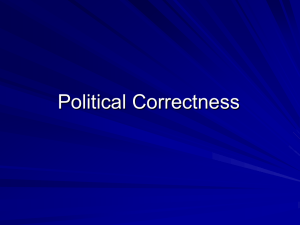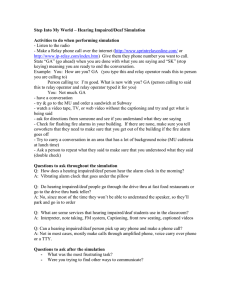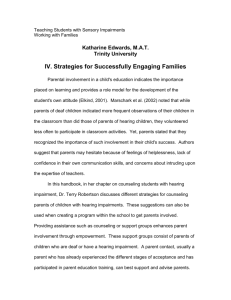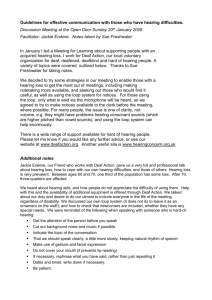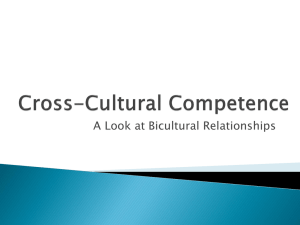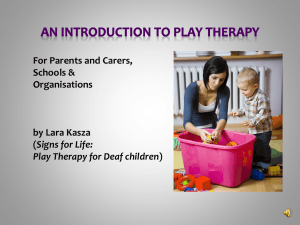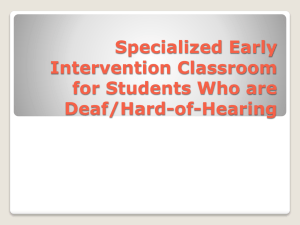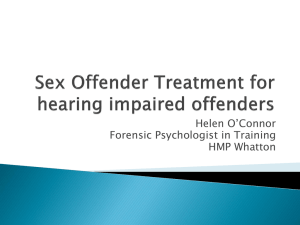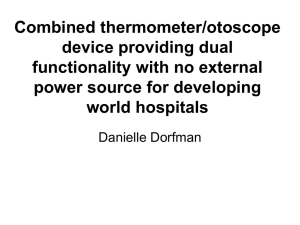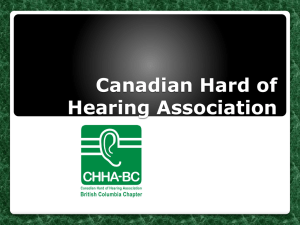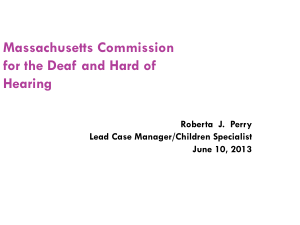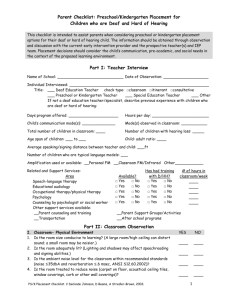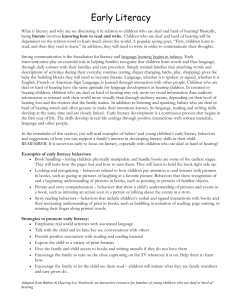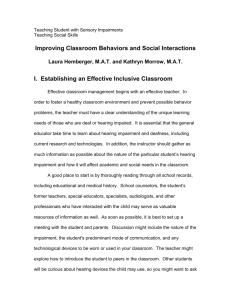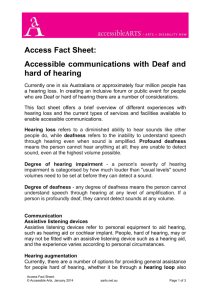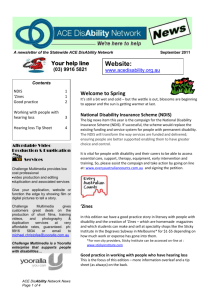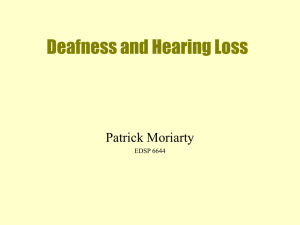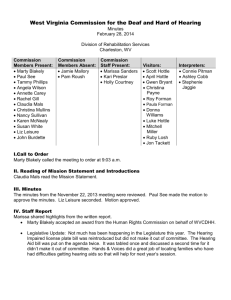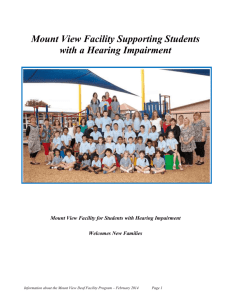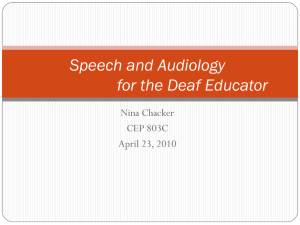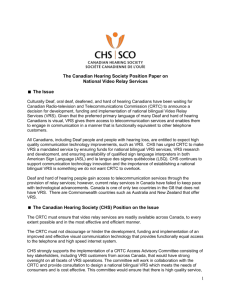Identifying the Barriers and Technology
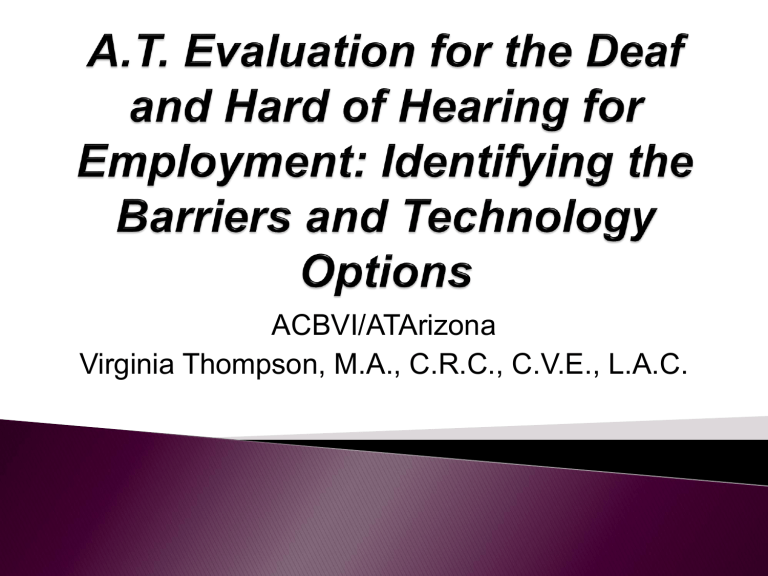
ACBVI/ATArizona
Virginia Thompson, M.A., C.R.C., C.V.E., L.A.C.
“The use of the cultural label of being Deaf can be a declaration of personal identity rather than an indicator of hearing ability.
American Sign Language unites people with profound hearing loss throughout the United States. Deaf Communities have their own educational institutions, social clubs and athletic organizations.
A variety of events, conferences and conventions take place on a regular basis, providing individuals who are deaf a wide variety of options in which to interact with others. In addition, the Deaf
Community engages in social and political activities exclusive to the Deaf Community.
The Deaf Community provides a sense of belonging for deaf people who might otherwise feel excluded from hearing culture.
A belief commonly shared by Deaf people is that deafness should not be regarded as an impairment or a disability.” Source: acdhh.org
The term "hard of hearing" refers to those who have some hearing and are able to use it for communication purposes (NAD, 2008)
Communication
◦
Methodology
◦
Technology options
Language
◦
American Sign Language
◦
Pidgin Signed English
Perceived communication barriers
◦ Employers’ perspective
Average Cost of Accommodations
◦ Studies by the President’s Committee's Job
Accommodation Network have shown that 15 percent of accommodations cost nothing, 51 percent cost between $1 and $500, 12 percent cost between $501 and $1,000, and 22 percent cost more than $1,000. Source: Michigan Community
Service Commission
In 2011, a study led by researchers from Johns Hopkins reported that nearly 20% of Americans 12 and older have hearing loss so severe that it may make communication difficult.[4] The study also found that
30 million Americans (12.7% of the population) had hearing loss in both ears while 48 million Americans (20.3% of the population) had hearing loss in one ear.[5] According to 2010 data from the National
Institute on Deafness and Other Communication Disorders (NIDCD), approximately 17% of American adults (36 million people) report some degree of hearing loss.[6] Of this group, 18% of American adults between the ages of 45 and 64 have experienced some degree of hearing loss.[7] NIDCD estimates that approximately 15% of
Americans between the ages of 20 and 69 (26 million people) have high frequency hearing loss due to exposure to loud sounds or noise at work or in leisure activities.[8] Source: EEOC
According to 2005 population statistics, about
8.6% of Arizonans are estimated to have hearing loss. One-third of Arizona Seniors have hearing loss. Just under 1% of the Arizona population is
Deaf. Source: Arizona Commission for the Deaf and Hard of Hearing (ACDHH)
Counseling Technique used
Holistic Approach
Comprehensive Interview
◦
Going beyond the obvious disability
Comfort Level
Current and Future Needs
◦
Social
◦
Employment
◦
Education
Make a connection
Establish Safety
Ask Open-Ended Questions
Actively Listen
Provide Validation and Feedback
Express Empathy
Explain How Helping Process Works
Home
◦
Why address this?
◦
Safety
Social
◦
Why address this?
◦
Psychosocial impact
Work
◦
What is involved and planning for future
Education
◦
What may be used in education that applies to work
What do they know?
◦
Exploring what they use now
◦
Exploring what they used in the past
◦
Exploring both low and high technology
◦
Exploring available technology used daily
◦
White Board
◦
Ubi Duo
◦
Sign Language Interpreter
◦
Video Phone and Video Relay Service
◦
Video Remote Interpreting
◦
TTY and NexTalk
◦
Telephone Relay Service
◦
IP Relay (Internet Protocol Relay)
◦
Tablet
◦
Smartphone
https://www.youtube.com/watch?v=1EJ4g3J6cJM
&noredirect=1
http://www.youtube.com/watch?v=zRoMzd8AQoI
http://www.youtube.com/watch?v=1l37lzLIg
QU
White Board
Ubi Duo
Telephone Amplification
Tablet
Smart Phone
Captioned Telephone
FM System (Integrated and Regular) and Loop System
Streamer
TTY, Uniphone, and NexTalk
Telephone Relay Service including VCO and HCO
www.atarizona.com
www.acbvi.org
www.aztap.org
www.askjan.org
www.harriscomm.com
http://www.dsi-tty.com/index.aspx
https://chs.asu.edu/shs/clinic www.acdhh.org
Contact Information
Virginia Thompson, M.A., C.R.C., C.V.E., L.A.C.
ACBVI.ORG
3100 E. Roosevelt
Phoenix, Arizona 85008 vthompson@acbvi.org
Cell: (602) 358-1726
